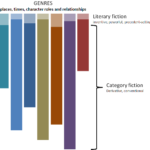
 In a recent Guardian rant by Edward Docx (a writer with the odd misfortune of sharing his name with a word processor file extension) the peculiar fantasy that there is a fundamental “difference between literary and genre fiction” is once again stitched together Frankenstein-like from bits of half-dead prejudice, tiresome artifice, and simple humanistic hubris.
In a recent Guardian rant by Edward Docx (a writer with the odd misfortune of sharing his name with a word processor file extension) the peculiar fantasy that there is a fundamental “difference between literary and genre fiction” is once again stitched together Frankenstein-like from bits of half-dead prejudice, tiresome artifice, and simple humanistic hubris.
It is time to double-tap this stubborn literary zombie and put an end to its virulent intellectual jaundice once and for all.

 ZAD. Crooked like the letter Z. He is a mere zad, or perhaps zed; a description of a very crooked or deformed person.
ZAD. Crooked like the letter Z. He is a mere zad, or perhaps zed; a description of a very crooked or deformed person.

 procraftinate /pro-kræf-ti-neit/ v. – to put off writing and sending query letters to literary agents so one can continue researching, writing, and rewriting fiction.
procraftinate /pro-kræf-ti-neit/ v. – to put off writing and sending query letters to literary agents so one can continue researching, writing, and rewriting fiction.